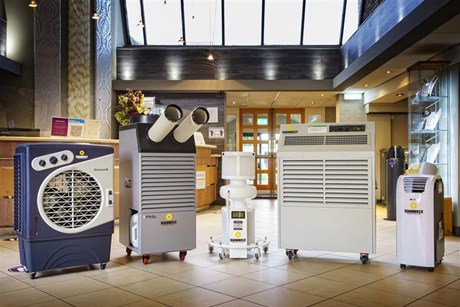The Ultimate Guide to Avoiding Heat Stress in the Workplace (2025)
blog 07 Jul 2023
When the temperature rises, so does the risk of heat stress – especially for workers in outdoor or high-temperature environments. Whether you're managing a team on-site or working in a warehouse, occupational heat stress is a real and rising concern. This guide covers everything you need to know to protect your team, from early warning signs to preventative strategies.
Quick navigation
- What is heat stress?
- Symptoms: What to watch for
- Who’s most at risk?
- How to prevent heat stress
- What the law says
- Smart equipment choices
- What to do in an emergency
- Final tips

What is heat stress and why does it matter?
Heat stress happens when the body can’t cool itself fast enough - due to high temps, strenuous work, and heat-trapping PPE. If left unchecked, it can quickly progress to heat exhaustion or heatstroke.
Did you know? The number of UK heat-related workplace incidents rose 28% from 2020 to 2024 (HSE data).
Symptoms: what to watch out for
Recognise symptoms early to prevent escalation:
Early signs
- Heavy sweating
- Headache or nausea
- Muscle cramps
- Weakness or fatigue
Severe signs - Confusion or irritability
- Vomiting
- Fainting
- Seizures or collapse
Tip: Train teams to monitor themselves and each other during hot spells.

Who’s most at risk of heat stress?
Anyone working in heat is at risk of heat stress. Some environments and jobs increase the risk:
- Construction workers exposed to sun + physical labour
- Manufacturing staff near ovens or furnaces
- Warehouse teams in poorly ventilated areas
- Utility crews working long hours outdoors
- People with underlying conditions (e.g. heart disease)
Some people, such as those with existing health conditions, may be more vulnerable.
Heat stress control measures
Hydration & Breaks
- Drink cool water every 15–20 minutes
- Avoid caffeine or energy drinks
- Encourage frequent, shaded breaks
PPE & Clothing - Use lightweight, breathable PPE
- Avoid gear that traps heat (e.g. foul weather PPE in summer)
- Remove PPE during breaks in safe zones
Shift Management
- Rotate workers to limit prolonged exposure
- Reduce physically intense tasks during peak heat hours
Ventilation & Cooling
- Use fans, air conditioning, or evaporative coolers
- Provide temporary shelters or shaded areas

Heat stress regulations in the workplace
UK regulations require employers to protect workers from known risks - including heat.
Key Regulations:
- Workplace (Health, Safety and Welfare) Regulations 1992
- Requires indoor temperatures to be “reasonable” (usually 16°C+)
- Health and Safety at Work Act 1974
- Mandates risk assessments and control measures
Employers must:
- Conduct a heat stress risk assessment
- Provide training and PPE
- Adapt working conditions during high heat
Smart equipment for effective heat management

Hiring the right gear can make a big difference:
• Temporary cooling solutions - From portable fans to evaporative coolers, the right equipment can make all the difference. Portable cooling fans circulates the air in enclosed spaces, whilst evaporative coolers reduces the temp by up to 10°C
- Shelters and shaded rest stations reduce sun exposure during breaks
- Hydration stations provide constant access to chilled water and welfare units offer cooled areas for rest and recovery
What to do in an emergency
If someone shows signs of heat stress:
- Move them to a shaded or cool space
- Give water to drink (small sips, not gulping)
- Remove excess clothing/PPE
- Seek medical help if symptoms worsen or do not improve quickly
Final tips and takeaways
- Regular training and awareness are key to prevention
- Monitor weather forecasts and plan around extreme heat, adjusting shifts accordingly
- Build a team culture of looking out for one another on-site
Check and maintain all cooling equipment regularly.

 Open your account online within 24 hours
Open your account online within 24 hours  Nationwide, next day delivery available
Nationwide, next day delivery available  Over 200 locations near you
Over 200 locations near you